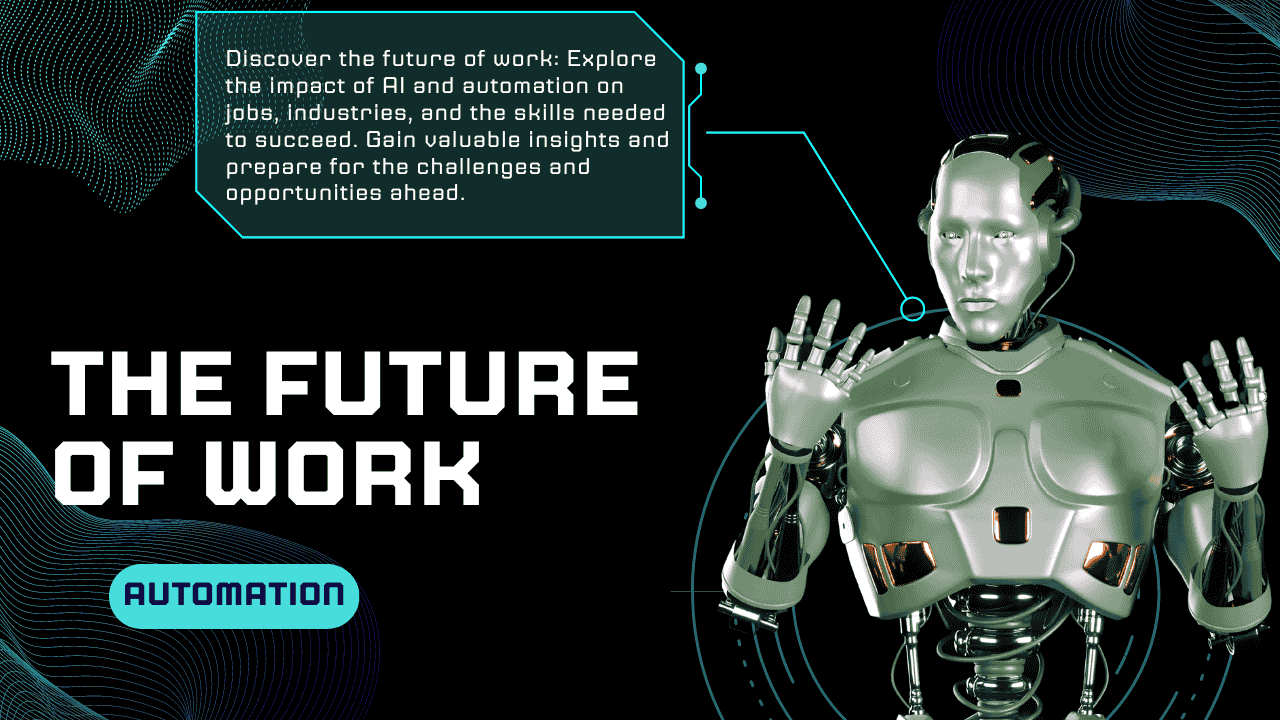The Future of Work: A Balancing Act Between Automation and Human Ingenuity;
The rapid advancement of automation technologies, fueled by artificial intelligence and machine learning, is reshaping the global job market. While these innovations promise increased efficiency and productivity, they also raise concerns about job displacement and economic inequality.
The Impact of Automation on Jobs
Job Displacement: Routine and repetitive tasks, especially those in manufacturing and customer service, are highly susceptible to automation.
Job Creation: However, automation also creates new jobs, particularly in fields like technology, data science, and AI development.
Job Transformation: Many existing jobs will undergo significant transformation, requiring workers to adapt and acquire new skills.
The Role of Human Skills in the Age of Automation;
To thrive in the future of work, individuals will need to focus on skills that machines cannot easily replicate:
Creativity and Innovation: The ability to think critically, solve problems, and generate new ideas will be highly valued.
Emotional Intelligence: Strong interpersonal skills, empathy, and the ability to build relationships will be essential for human-centric roles.
Adaptability and Lifelong Learning: The capacity to learn new skills and adapt to changing circumstances will be crucial for navigating a rapidly evolving job market.
Preparing for the Future of Work;
To prepare for the challenges and opportunities presented by automation, individuals, businesses, and governments must take proactive steps:
Education and Training: Investing in education and training programs that equip workers with the skills needed for the future of work.
Upskilling and Reskilling: Providing opportunities for workers to acquire new skills and knowledge throughout their careers.
Social Safety Nets: Implementing strong social safety nets to support workers who are displaced by automation.
Ethical Considerations: Developing ethical guidelines for the development and deployment of AI and automation technologies.
A Collaborative Future;
The future of work is not a zero-sum game between humans and machines. Rather, it is an opportunity for collaboration, where AI and automation augment human capabilities, enabling us to achieve greater heights. By embracing change, investing in education, and prioritizing human values, we can navigate the challenges and reap the rewards of the automation age.
Would you like to explore a specific aspect of the future of work in more detail, such as the impact on specific industries, the role of government policy, or the ethical implications of AI?
The Ethical Implications of Automation
As automation continues to advance, ethical considerations become increasingly important. Here are some key ethical issues:
Job Displacement and Economic Inequality
Fair Distribution of Wealth: How can we ensure that the benefits of automation are distributed equitably, preventing economic inequality and social unrest?
Universal Basic Income: Should we implement a universal basic income to support people who lose their jobs to automation?
Worker Retraining: How can we provide effective retraining programs to help displaced workers transition to new careers?
Privacy and Surveillance
Data Privacy: How can we protect individuals’ privacy as AI systems collect and analyze vast amounts of personal data?
Surveillance Capitalism: How can we balance the benefits of data-driven innovation with the risks of surveillance and manipulation?
Bias and Discrimination
Algorithmic Bias: How can we ensure that AI algorithms are fair and unbiased, avoiding discrimination against marginalized groups?
Transparency and Accountability: Who is responsible for the decisions made by AI systems, and how can we hold them accountable?
Autonomous Weapons
Human Control: How can we ensure that humans retain control over autonomous weapons systems?
Accountability: Who is responsible for the actions of autonomous weapons, and how can we prevent their misuse?
Environmental Impact
Resource Consumption: How can we minimize the environmental impact of AI and automation, particularly in terms of energy consumption and electronic waste?
Sustainable Development: How can we use AI to address global challenges like climate change and resource depletion?
The Future of Work
Human-AI Collaboration: How can we design workplaces that foster effective collaboration between humans and AI?
New Skills and Competencies: What skills and competencies will be essential for the future workforce?
To address these ethical challenges, we need a multi-faceted approach involving:
Ethical Guidelines: Developing clear ethical guidelines for AI development and deployment.
Regulation: Implementing appropriate regulations to govern AI and automation.
Education and Training: Investing in education and training to equip workers with the skills needed for the future of work.
International Cooperation: Fostering international cooperation to address global AI challenges.
Public Awareness and Engagement: Promoting public understanding of AI and its implications.
By proactively addressing these issues, we can harness the power of automation to create a more just, equitable, and sustainable future.
